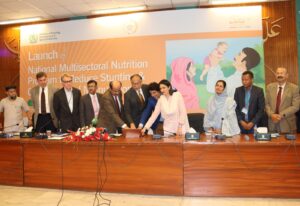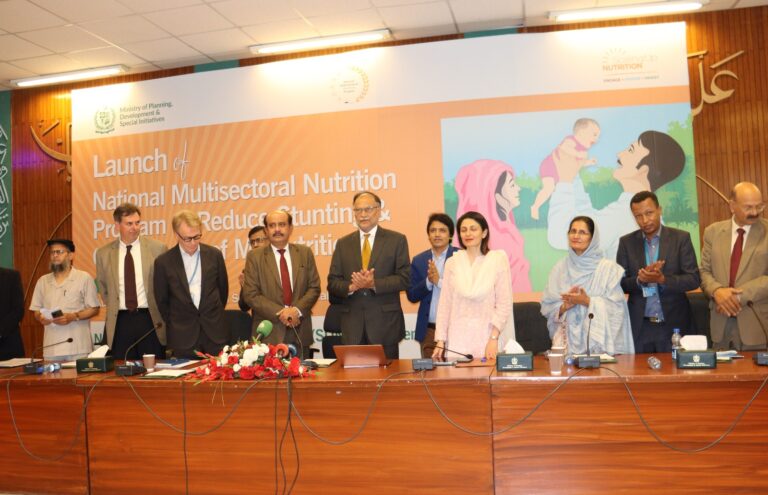The Ministry of Planning Development & Special Initiatives on Wednesday formally launched “National Multisectoral Nutrition to Reduce Stunting & Other Forms of Malnutrition” worth Rs. 8.5 billion under Pakistan Nutrition Initiatives (PANI).
The formal launched was held at the Planning Ministry where Federal Minister for Planning Development & Special Initiatives Professor Ahsan Iqbal launched it.
This multisectoral program is for 36 high burdened stunted, calamity hit and backward districts of the country which includes 12 from Baluchistan, 10 from Sindh, 5 from GB, AJ&K and Punjab 2 each.
The objective of the program is to reduce stunting and other forms of malnutrition with multisectoral approach. The other objectives of the project are Provision of Micronutrients & Nutritional Supplements, Provision of Re Program ady-to-Use Therapeutic and supplementary Foods to treat and prevent stunting & wasting, Promote Healthy Dietary Practices and Early Childhood Development, advocacy and behavioral change, research of local cause local solution, development of local food supplements and Provision of Iron Folic Acid Supplementation and deworming for Adolescent Girls, Children, and Pregnant & Lactating Women.
Speaking at the launching ceremony, the Minister said that Pakistan is a country with a high-level of food insecurity as per National Nutrition Survey (NNS 2018), nearly 37% of households are food insecure, with regions like Balochistan and KP’s newly merged districts being even worse.
Furthermore, 40.2% of children under the age of five suffer from stunted growth, 29% are underweight, and 17.7% are wasted, and these figures have remained stagnant for over three decades which is why under-nutrition accounts for nearly half of all deaths in children under five.
The most common deficiencies in Pakistan are those of iron, protein, vitamin A, vitamin D, zinc, and folic acid. Iron deficiency, leading to issues like anemia, low birthweight, and poor weight gain, affects children the most in the first two years of life.
The NNS 2018 confirms that 49.1% of children in the country are iron deficient. He further added that the future of our children is at risk as 40% are stunted hence, we have launched PANI.
He added that according to the Global Hunger Index 2022 Pakistan ranks 99th out of 121 countries, indicating a ‘serious’ level of hunger.
He said that the 2022 monsoon flooding distressed nutrition indicators. He emphasised the importance of nutrition and its impact on growth and development.
He stressed upon the multisectoral approach to address all the underlying determinants and other confounding factors that contributes to malnutrition such as food adulteration, poor water sanitation and health & hygiene, in order to have a whole of society and whole of government approach.
He mentioned that PANI is a part of a larger effort of investment into the health and development of our people.

“We are committed to investing in our children and address issues of nutrition, said the Minister while highlighting the several of initiatives which have been taken Hepatitis elimination I initiative worth Rs35 b, initiative for out of school children of Rs25B, initiative for prevention of diabetes of Rs 6.8 b and initiative for 20 poorest districts worth Rs 40 billion to uplift the socio-economic status at par with other districts in 5 – 7 years.
The Planning Minister mentioned that after 18th amendment most of the social sectors have been devolved to the provinces hence it’s their responsibility to initiate such programs and align their resources which initiatives such as PANI.
He urged all stakeholders to align resources and efforts, translate commitments into tangible action for the children of the country.
Nadia Rehman Member Food Security & Climate Change, Planning Commission said that despite investment the Nutrition indicators have not been changed. Its due to the focus on symptomatic treatments in past however, its now evident that the problem manifests in underlying drivers.
Malnutrition is not only impacting the physical growth to cause physical stunting but also it hinders mental growth causing mental stunting, she added.
She further added that this initiative will give an opportunity to the provinces, development partner and line ministries and departments to align their resources to address the issue of malnutrition with this program.
Dr. Nazeer Ahmed Chief Nutrition of Planning Ministry mentioned that nutrition is heart of SDGs and 12 out of 17 are linked with nutrition. Without improving the nutrition status, we cannot achieve the SDGs 2030 agenda. He further added the return of nutrition $16 for each dollar invested. Pakistan losses approximately $7.6 Billion every year due to malnutrition (Economic consequences of under nutrition Pakistan in 2017.


